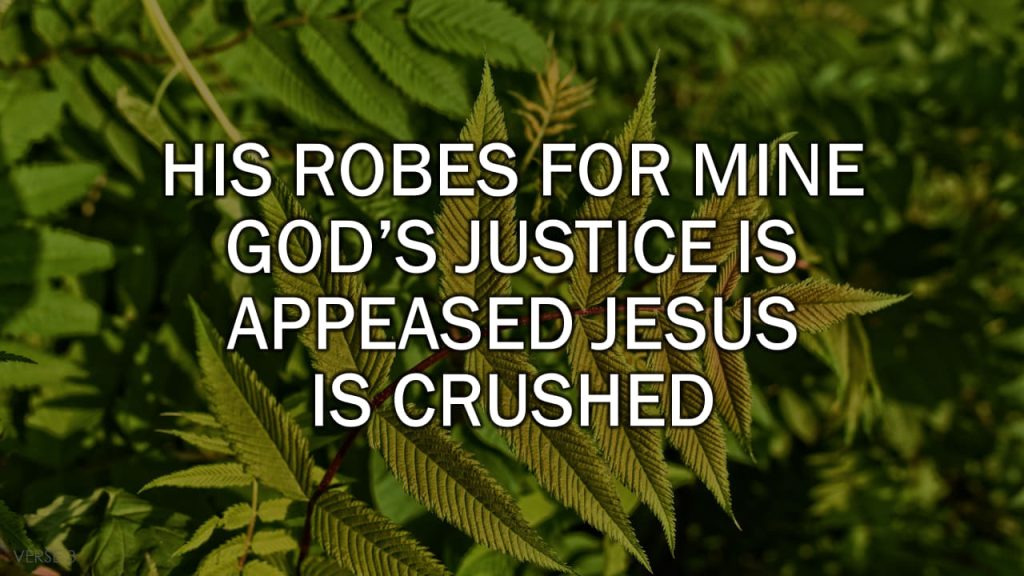His Robes for Mine is a powerful Christian worship song that highlights the doctrine of substitutionary atonement, emphasizing Christ’s righteousness, sacrifice, and redemption. Through profound lyrics, it proclaims the exchange of sin for righteousness, the satisfaction of God’s justice, and the believer’s secure salvation in Christ.
VERSE 1
His robes for mine:
O wonderful exchange!
Clothed in my sin,
Christ suffered ‘neath God’s rage.
Draped in His righteousness,
I’m justified! In Christ I live,
For in my place He died.
VERSE 2
His robes for mine:
What cause have I for dread?
God’s daunting law
Christ mastered in my stead.
Faultless I stand
With righteous works not mine,
Saved by my Lord’s
Vicarious death and life.
CHORUS
I cling to Christ,
And marvel at the cost:
Jesus forsaken,
God estranged from God.
Bought by such love,
My life is not my own.
My praise, my all,
Shall be for Christ alone.
VERSE 3
His robes for mine:
God’s justice is appeased.
Jesus is crushed,
And thus the Father’s pleased.
Christ drank God’s wrath
On sin, then cried “‘Tis done!”
Sin’s wage is paid;
Propitiation won!
CHORUS
I cling to Christ,
And marvel at the cost:
Jesus forsaken,
God estranged from God.
Bought by such love,
My life is not my own.
My praise, my all,
Shall be for Christ alone.
VERSE 4
His robes for mine:
Such anguish none can know.
Christ, God’s beloved,
Condemned as though His foe.
He, as though I,
Accursed and left alone;
I, as though He,
Embraced and welcomed home!

Story Behind the Hymn
His Robes for Mine is a hymn that delves into the profound Christian doctrine of substitutionary atonement, illustrating the exchange of humanity’s sinfulness with Christ’s righteousness.
The lyrics were penned by Chris Anderson, a pastor who, at the time, was ministering in Ohio. The music was composed by Greg Habegger, another pastor serving in Indiana.[1]
Chris Anderson, the founding pastor of Tri-County Bible Church in Madison, Ohio, wrote the hymn to emphasize key doctrines such as justification by grace through faith and the concept of double imputation—the exchange of our sins for Christ’s righteousness at conversion.[2]
The hymn’s four verses each focus on major themes within the doctrine of justification. Verse 1 addresses “The Great Exchange,” where Jesus Christ was made sin for humanity to declare believers righteous in Him. Verse 2 highlights Christ’s active obedience, mastering God’s Law on behalf of sinners. Verse 3 discusses the satisfaction of God’s justice through Christ’s sacrifice, and Verse 4 reflects on the believer’s response to this profound gift.[3]
Since its introduction, His Robes for Mine has been embraced by congregations for its rich theological content and singable melody. The hymn continues to be a meaningful part of worship services, prompting believers to reflect deeply on the sacrificial love of Christ and the transformative power of His righteousness.
The Great Exchange: Christ’s Righteousness for Our Sin
“His robes for mine” expresses the doctrine of imputation, where Christ takes upon Himself the sinner’s guilt while granting His righteousness in return. This truth aligns with 2 Corinthians 5:21, which declares, “For he hath made him to be sin for us, who knew no sin; that we might be made the righteousness of God in him.” The exchange of sin and righteousness is central to salvation, highlighting God’s grace.
“Clothed in my sin, Christ suffered ‘neath God’s rage” affirms that Christ bore the penalty of sin under God’s judgment. Isaiah 53:5 states, “But he was wounded for our transgressions, he was bruised for our iniquities: the chastisement of our peace was upon him.” This suffering was necessary for reconciliation with God.
“Faultless I stand with righteous works not mine” upholds justification by faith alone. Philippians 3:9 confirms, “And be found in him, not having mine own righteousness, which is of the law, but that which is through the faith of Christ.” Salvation is not by human effort but through Christ’s righteousness.
“Jesus forsaken, God estranged from God” refers to Christ’s cry on the cross, “My God, my God, why hast thou forsaken me?” (Matthew 27:46). This reflects the weight of sin causing separation, yet fulfilling God’s redemptive plan.
The song is theologically rich, accurately presenting substitutionary atonement, justification, and propitiation. It aligns with Scripture, with no contradictions, making it a sound hymn for Christian worship.
Relevant Bible Verses about His Robes for Mine Hymn
“For He made Him who knew no sin to be sin in our behalf, so that we might become the righteousness of God in Him.” 2 Corinthians 5:21 NASB
“But He was pierced for our offenses, He was crushed for our wrongdoings; The punishment for our well-being was laid upon Him, And by His wounds we are healed.” Isaiah 53:5 NASB
“And be found in Him, not having a righteousness of my own derived from the Law, but that which is through faith in Christ, the righteousness which comes from God on the basis of faith.” Philippians 3:9 NASB
“About the ninth hour Jesus cried out with a loud voice, saying, ‘Eli, Eli, lama sabachthani?’ that is, ‘My God, My God, why have You forsaken Me?'” Matthew 27:46 NASB
“He Himself is the propitiation for our sins, and not for ours alone, but also for the sins of the whole world.” 1 John 2:2 NASB
His Robes For Mine lyrics by Chris Anderson and music by Greg Habegger, (2008) Public Domain